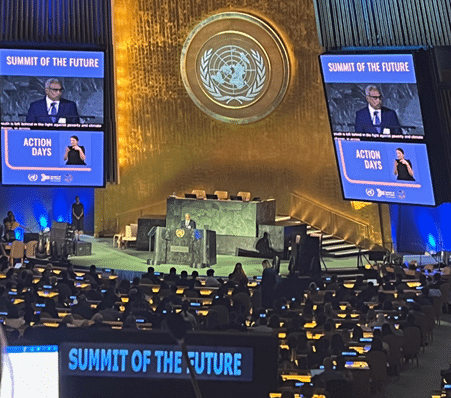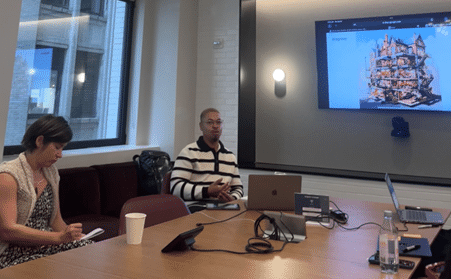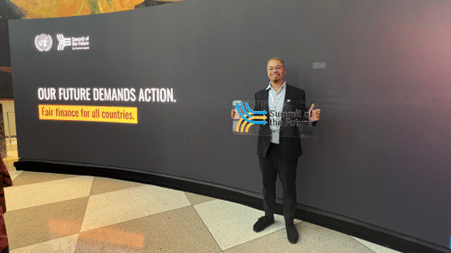
The Action Days leading up to the Summit, where member states would vote on the Pact for the Future, began with a youth-led afternoon, followed by a Saturday programme centred on three priority themes: digital and technology, peace and security, and sustainable development and financing. Throughout the day, there was also a dedicated focus on future generations. Participants included Heads of State, Ministers, senior UN officials and representatives from the private sector, civil society and other actors.
As a leader of a youth-centred charity in the UK the Summit presented a crucial opportunity to centre the needs and aspirations of the young people we support at Blagrave while advocating for future generations. Engaging with global leaders and stakeholders allowed me to break free from our UK bubble, expanding my understanding of the diverse challenges and innovative solutions that exist worldwide. This exposure fostered some invaluable knowledge exchanges, the building of new relationships and a real solid opportunity to dream big. I’m excited by the conversations that have unfolded since, the offers to share best practices, to ‘shout into the wind together’ about shared challenges, and much more.
A highlight for me was meeting the incredible Sophie Howe, who served as Wales’s first Future Generations Commissioner from 2016 to 2023. In this role, she championed the interests of future generations and supported public bodies in advancing the well-being goals outlined in the Well-being of Future Generations (Wales) Act 2015. Sophie has been instrumental in supporting the development of the Pact for the Future.
I am feeling hopeful about witnessing the determination and powerful role that the newly set up UN Youth Office can play in creating new opportunities for youth leadership within the United Nations. For me this signifies a great shift with the specialised mechanism putting young people at the heart of the UN’s agenda. I am hopeful that their message of ensuring concrete commitments come out of other UN offices and departments to make youth engagement a staple of all UN processes lands in action.

I had the opportunity to hear from Dan Carden, Labour MP for Walton in Liverpool and President of Young Parliamentarians at the IPU. He delivered a powerful message, urging , “We need to wake up to unprecedented global crisis, economic models have concentrated power and wealth in the hands of a few. These crises are a result of political calculations and intentional decisions.” He emphasised the IPU’s commitment to ensuring young people have a place at the decision-making table.” Carden continued with a strong call to action: young people need access to quality education and opportunities to envision a different world. He underscored the need for more young MPs to help drive this agenda forward, noting that despite half the world’s population being under 30, only 2.8% of parliamentarians are young people. “This summit is more than just a meeting,” he concluded. “It is an anchor point for a more hopeful future.”
The Pact for the Future serves as a vital framework for centring future generations in our decision-making processes today. By prioritising the needs and rights of young people and those yet to be born, this initiative encourages leaders to consider the long-term impacts of their choices on the environment, society, and economy. It fosters a forward-thinking mindset that challenges short-term thinking and promotes sustainable practices, ensuring that today’s actions do not compromise the well-being of future generations. By integrating the principles of the Pact into our decision-making, we can create more equitable and sustainable solutions that not only address current challenges but also empower future leaders to thrive in a healthier world.
In a session with UN Secretary-General António Guterres and a number of young changemakers, the focus was on meaningful youth engagement, dismantling barriers, and addressing the risks of tokenism. Daphne Frias, a young climate activist, underscored the need to bring young people from the margins to the forefront, advocating for an intersectional approach. She highlighted the importance of reverse mentoring, where older decision-makers could benefit from learning directly from youth perspectives on shaping the future. “It should not be controversial to fight for the climate,” she said.
The Secretary-General faced challenging questions from the audience, including why UN representatives are often prioritised over the voices of actual communities and why the UN Charter lacks explicit references to youth as central stakeholders. Guterres acknowledged these barriers to authentic youth engagement within the UN and emphasised that young people would play a critical role in implementing the Pact for the Future. He noted that genuine progress requires older generations to step aside, “admitting they have failed, urgently relinquishing power, and making peace with nature—starting by giving young people a seat at the table.” He concluded by saying, “the primary mission of my generation should be to empower the next.” I see this as our guiding principle here at the Blagrave Trust.
What is the UN’s Pact for the Future?
The UN’s Pact for the Future is an initiative aimed at transforming the way the United Nations operates to address global challenges better. Officially introduced in September 2021 during a UN General Assembly meeting, which followed the Action Days I attended, it focuses on several key areas:
Reforming the UN:
The pact seeks to make the UN more efficient and accountable, ensuring it can respond more effectively to crises like climate change, pandemics, and conflicts.
Global Cooperation:
It emphasizes the importance of international collaboration, urging countries to work together to tackle pressing issues that affect everyone.
Sustainable Development:
The pact reinforces the commitment to the Sustainable Development Goals (SDGs), promoting a fair and sustainable future for all.
Inclusivity:
It highlights the need for more inclusive decision-making processes, ensuring that the voices of all people, especially marginalized communities, are heard.
Overall, the Pact for the Future aims to rejuvenate the UN’s role in fostering peace, security, and development in a rapidly changing world.
I attended several brilliant events held by other organisations, including a roundtable on long-term governance in the world hosted by the School of International Futures.
I also attended the Slow Factory’s first gala event, ‘Global South Renaissance’. In addition, we ran our own fringe event, ‘Resourcing Young People’s Futures – a funder roundtable’.
Resourcing Young People’s Futures was a co-hosted event between Blagrave and the Paul Hamlyn Foundation’s Kinship Discovery team. Our event explored questions we are currently holding about how to resource young people’s futures by moving wealth into their stewardship, as well as how to embed accountability to future generations into our practices and governance. At this event, I shared the exciting news that the Blagrave Trust is in the process of exploring our relationship with our assets using a community wealth-building lens to see how we can develop a new relationship with the wealth we steward that prioritises the positive impact on young people and future generations. We look forward to sharing our learning publicly in 2025.

The experiences and connections made during this trip will undoubtedly inform our ongoing initiatives and strengthen our resolve to be bold in our commitments to young people across England. I thank the Paul Hamlyn Foundation for supporting me in attending the Summit and for all those I met in New York, thank you for your time, energy and commitment to our shared missions, I am still buzzing with inspiration and ideas.
Stay tuned for more updates as we continue to grow our thinking as to how we make decisions now that positively impact future generations of young people.
Eli Manderson Evans, CEO

